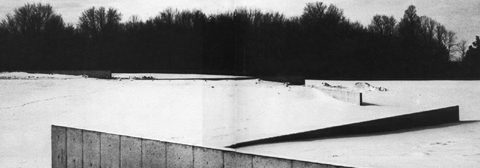Socrates first discovered the concept, or eidos as the relation between the particular and the general and as a germ of a new meaning of the general question concerning being. This meaning emerged in its full purity when the Socratic eidos went on to unfold into the (transcendental) Platonic "Idea." (see also essence) The eidos is absolutely and eternally real, but in respect to each single realization, it is the possible, its potentiality.
Read Moreconceptual
Barbara Kruger
nature / culture
The Nature / Culture distinction is one of the most visible of those "marked" oppositions in Western culture, that attribute a superiority of one term over the other. The unmarked category is the category present to itself, the category of identity. The marked category is the category of " otherness," of value defined by another. Of course, sometimes the latter term is used in the critique of these dualisms -- held up as a superior term (perhaps under another set of conditions)...
Read MorePhase space
Phase space: (or state space) Allows representation of the behaviour of a system in geometric form. The number of dimensions required for the phase space is a function of the "degrees of freedom" of the system.
A dynamical system consists in two parts: the notions of a state (the essential information about a system) and a dynamic (a rule that describes how the state evolves with time). This evolution can be visualized in a phase space. Phase spaces can have any number of dimensions, corresponding to the “degrees of freedom” of the system. The figures drawn in the phase space that describe the system's behavior are phase portraits.
Theory
"It is the theory that decides what we can observe." (Einstein)
"It is more important that a theory be beautiful than it be true." (Paul Dirac)
In Greek, theoria originally meant a looking at or viewing and theoreo, a spectator. In this sense, theory and Visuality are metaphors of each other.
Is the theoretical attitude is that of the disengaged observer? Does theory require a distinction between the illusionless observer and the gullible participant, or to put it more mildly, between theory and observation? Does theory always entail what John Dewey derided as the "spectator theory of knowledge"? Perhaps to theorize is to create the impression of something that existed already (or, even better, always already) (see metaphor) In the Pragmatic tradition, theory is the critical reflection on "belief." William James calls it "an appetite of the mind," what Frank Lentricchia calls "the need to generalize" and "to obliterate differences." (quoted in Cary Wolfe, Postmodern Theory and the Pragmatics of the "Outside" )
But according to the Greek conception, theory is not a knowledge but touching (thigein ).
Read Moreabstract/concrete
The etymological origins of "abstract" are the latin abs trahere , to draw away from. Thus the abstract is separated from body, object, or application. It can describe qualities apart from any object or thing. In Archaic Greek art, the genre of particular things outweighed their specific, individual qualities in artistic representation. Hence abstraction, expressed through the geometricization of natural forms, dominated Archaic art. A Greek polis , when understood as a particular pattern of life and not just a geographical grouping of people and their belongings, was essentially an abstract conception, just as a nation "is today. (see J.J. Pollitt, Art and Experience in Classical Greece.) When we describe a culture in terms of categories such as "religious," "economic," etc. we are not describing real subdivisions, but are making abstractions for our convenience. In the study of "structures" the practice of analysis consists in constructing "models" that replace the study of concrete phenomena by that of an object shaped through its definition.
Read Moreaggregate/systematic
"one of the most important tasks of Renaissance philosphy and mathematics was the creation, step by step, of the conditions for a new concept of space. The task was to replace aggregate space by system space ." (Cassirer, Individual and Cosmos p.182) (cf smooth / striated) (cf perspective )
Read Morealterity / other
"The negative construction of ....others is finally what founds and sustains European identity itself." (Hardt and Negri) For Hegel, the effort to overcome the Other is simultaneously an effort to overcome self- consciousness' own otherness to itself. Hegelian negativity simultaneously restored and systematized, unleashed and bound the power of the Other, against and within the consciousness of the Same. In the work of self-consciousness, which is desire in general, the subject finds ways to integrate what at first seems to lie outside itself. But during the ongoing course of this process, the subject changes, to the point that the subject can be considered only a term for the process that it accomplishes.
Read Moreanalytic/synthetic
For Logical Positivists, such as A.J.Ayer, the only statements that can be verified are those that are analytic. According to Ayer, they cannot be confirmed or refuted by facts of experience, and "do not make any assertion about the empirical world, but simply record our determination to use symbols in a certain way."
Read MoreAnthropic Principle:
The Anthropic Principle: explains the existence of cosmological facts by noting that only certain conditions could have evolved life in the universe: It is doubtedlessly correct that the universe in which we live is the kind of universe whose laws allow, at least in certain of its neighborhoods, for the emergence of creatures like us.
Read Moreaporia
For the Athenians, the nomadic Scythians were aporoi. While the Athenians valued authochthonous birth, the Scythians had absolutely no attachment to any place and were always somewhere else. For the imagination of urban Greeks, nomadism was the indelible mark of the Scythians' distance from civility, the sign and substance of an alien existence, the quintessence of otherness. (see also war machine)
Read Moreart historical
In the late nineteenth century, with the rise of a philosophically oriented art history, the philosophical issues of how we perceive space gave way to the psychological problem of how we come to take delight in the characteristics of formand space. The philosophical art historians sought the "basic principles," (Grundbegriffe ) underlying the creation and appreciation of art, and their historical transformations.
assemblage
The French terms of both agencement and dispositif used by Deleuze and Guattari are usually translated as assemblage. An assemblage is a "site at which a discursive formation intersects with material practices" (Jonathan Crary, Techniques of the Observor, p. 31) It is "simultaneously a machinic assemblage and an assemblage of enunciation" (D+G, Thousand Plateaus, p. 504)
Read MoreAutopoesis
Autopoesis is both a concept about self-maintaining systems, especially biological ones, and an epistemological theory about cognition and self-reference.
Read Morebachelor machine

The term "bachelor machine" was first used by Marcel Duchamp around 1913 in connection with pieces of work that would later be assembled in the Large Glass of 1915-1923. (Also known as the bride stripped bare by her bachelors, even) For Duchamp, the term refers specifically to the lower portion of the glass, the realm of the bachelors, which contains, among other things, the chocolate grinder, the cemetary for uniforms and liveries -- Priest, Delivery Man, Gendarme, Cuirassier, Policeman, Pallbearer, Footman, Stationmaster and Page Boy -- and the témoins oculistes. The Large glass consists of two distinct realms, the realm of the bride above, and the realm of the bachelors below, both desiring and imagining one another without any possibility of mutual comprehension. (one is here reminded of the real / imaginary distinction and the discussion of cyberspace)
Read Morebeing / becoming
For Cassirer, " Form thinking" belongs to being, while "causal thinking" belongs to becoming. But strict knowledge is only possible of the always-being. That which is becoming can only be described, if at all, in the language of myth. Or rather, myth is already familiar with both the question of the "what" and the question of the "whence." "It sees everything that it grasps (the world as well as the gods) under this double aspect." (The Problem of Form and the Problem of Cause, in The Logic of the Cultural Sciences, p. 87)
Read MoreUntitled work on paper, Maureen McQuillan 2019
Clinamen
According to the Lucretian account of chaos falling into order by the chance concourse of atoms -- Sometimes, wrote Lucretius, at uncertain times and places, the eternal, universal fall of the atoms is disturbed by a very slight deviation - the "clinamen." The resulting vortex gives rise to the world, to all natural things.
Read Moreclosed/open systems
A closed system in statistical thermodynamics is one in which the number of particles as well as the total energy are fixed by boundary conditions. Closed systems systems tend towards equilibrium and to increse in entropy.
Read Moreconsciousness
"Consciousness. The having of perceptions, thoughts, and feelings; awareness....When asked what consciousness is, we have no better answer than Louis Armstrong's when a reporter asked him what jazz is: "Lady, if you have to ask, you'll never know." (quoted in Pinker, How the Mind Works, p.60)
Read Moreconsensual hallucination
The term "consensual hallucination" is Gibson's (from Neuromancer), who is generally credited with coining the term Cyberspace. "What seems so alluring about the half-formed promise of VR technologies is the ideal of a world of one's own that one can share with others through consensus but that one can enter or leave at will ... that brings with it a certain guarantee of pleasure without danger." (E. Grosz, Anybody)
Read Morecontinuity/discontinuity

For Georges Bataille, (sexual)"Reproduction implies the existence of discontinuous beings." (Erotism, p.12) Each being is distinct from all others, including its parents, who are distinct from each other. For Bataille death means the continuity of being and is brought into play by reproduction. Death is the end of discontinuous being, of the being formed at the moment when the discontinuous entities of sperm and egg unite to form a new continuity, when two become one, and a new entity is formed from the fatal fusion. The fascination with both reproduction and death is the dominant element in Eroticism.
Read More
